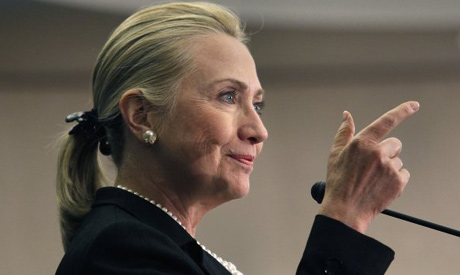
U.S. Secretary of State Hillary Clinton delivers a keynote address on "U.S. Strategic Engagement with North Africa in an Era of Change" at the Center for Strategic & International Studies (CSIS) in Washington. ( Photo: Reuters)
Secretary of State Hillary Clinton Friday defended US support for Arab Spring nations as "a strategic necessity," vowing never to retreat amid a firestorm over the attack on a US mission in Libya.
"We will not return to the false choice between freedom and stability. And we will not pull back our support for emerging democracies when the going gets rough," Clinton told a US think tank.
"That would be a costly strategic mistake that would, I believe, undermine both our interests and our values."
Republicans have seized on the September 11 attack at the US consulate in Benghazi, eastern Libya, to savage the administration of President Barack Obama, accusing it failing to protect diplomats and organizing a cover-up.
Four American diplomatic staff died in the attack, including ambassador Chris Stevens, the first envoy to be killed while on active duty since 1979.
Clinton acknowledged that "diplomacy, by its nature, has to be often practiced in dangerous places," in her speech to the Center for Strategic and International Studies.
"Our people cannot live in bunkers and do their jobs," she said, adding "Chris Stevens understood that diplomats must operate in many places where soldiers do not and cannot, where there are no other boots on the ground and security is far from guaranteed."
Weeks before the revolution in Egypt against longtime leader Hosni Mubarak broke out in January 2011, Clinton said she had warned Arab leaders at a meeting in Doha that the "region's foundations were sinking into the sand."
"It was clear even then that the status quo was unsustainable. That refusal to change was itself becoming a threat to stability," Clinton said.
"So for the United States, supporting democratic transitions is not a matter of idealism. It is a strategic necessity."
But she cautioned that "achieving genuine democracy and broad-based growth will be a long and difficult process.
"There will be setbacks along the way, times when some will surely ask if it was all worth it. But going back to the way things were in December 2010 isn't just undesirable, it is impossible."
Last month's attack in Benghazi "revealed strains of extremism that threaten these nations, as well as the broader region and the United States," the top US diplomat added.
"On the other hand, we've seen actions that would have been hard to imagine just a few years ago: Democratically-elected leaders and free people in Arab countries standing up for a peaceful, pluralist future.
"It is way too soon to say how these transitions will play out. But what's not in doubt is that America has a big stake in the outcome."
Clinton said the United States had mobilized some $1 billion since the start of the revolutions, and has asked Congress to set up a new $770 million fund tied to concrete benchmarks on political and economic reforms.
But she acknowledged that now that many longtime autocratic leaders had been deposed, the realities on the ground were changing.
"Today, these transitions are entering a phase that must be marked more by compromise than by confrontation. By politics more than protests," Clinton said.
The United States was aiming to help new democracies in three ways -- by "using all the tools in our arsenal to help our Maghreb partners fight terrorism," by introducing economic reform and by strengthening democracy.
In the Maghreb region, Washington was helping nations to break down trade barriers to create new jobs and markets, Clinton said.
"Today North Africa is one of the least integrated regions in the world. But it doesn't have to be that way. Opening the border between Algeria and Morocco would be an important step in this direction."
Short link: